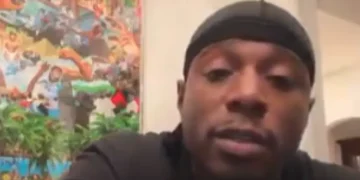Cindi Mittlestadt and her daughter, Patricia Huber, at a press conference at the state Capitol on April 15, 2025, calling on legislators to pass funding to extend services for disabled Arizonans without sharply limiting a program that pays parents to be caregivers for their children as Republicans want to do. Photo via Arizona Senate Democrats | Bluesky
Jaime Kelley struggled to hold back the tears as she pleaded with lawmakers to save the program that lets her care for her adopted daughter, who requires around-the-clock ICU-level care in her home.
“We’ve been on the edge of a cliff,” she said, explaining that she and other parents are about “to crack” under the stress of caring for profoundly disabled children while trying to convince legislators of their plight in the hopes that they won’t scuttle the funding that lets them do so.
Through her tears, Kelley spoke directly to her husband, who was watching the livestream of Tuesday’s House Appropriations Committee hearing with their daughter, and told him not to let Evelyn see her on the verge of breaking down in the crowded hearing room at the state Capitol.
Then Kelley turned her focus back to the 21 legislators sitting in front of her, as she began to lose the battle to keep her tears at bay.
“Please hear me,” she begged them as her tears began to flow.

When the hearing concluded, more than four hours after it began and after more than a dozen members of the developmentally disabled community and their caregivers — mostly parents of children who need extraordinary care — the GOP-controlled committee narrowly passed the bill that Republicans have crafted to keep the Division of Developmental Disabilities (DDD) from going bankrupt in just a few weeks.
While that might seem like a good thing for those parents and advocates, none were pleased with the outcome. All were there in opposition to House Bill 2945, primarily because of the restrictions it places on the Parents as Paid Caregivers (PPCG) program that has been a lifeline to families like Kelley’s.
The PPCG pays parents to provide in-home care to their own children, but only if they require “extraordinary care” above and beyond typical parenting tasks. That might include assisting a teenager who has cerebral palsy, autism or cognitive disabilities with tasks like bathing, dressing and eating. The program was initially entirely federally funded, but beginning this month, the state is on the hook for around one-third of the cost.
The program has expanded over the last year from about 3,000 participants to around 6,000, which came with substantial cost increases, accounting for a large chunk of a $122 million shortfall in the DDD budget. That shortfall threatens to shut down services for disabled people in Arizona at the end of the month unless the Legislature acts.
And while both Republicans and Democrats are united in saying they won’t let that happen, the funding has become a political football, with Republicans blaming Gov. Katie Hobbs for expanding the PPCG program without legislative approval. They have said they won’t give her the money to keep DDD solvent without major reforms. Hobbs in turn has demanded they send her the money now and propose reforms to the system later.
GET THE MORNING HEADLINES.
The PPCG program was implemented in 2020 during the height of the COVID-19 pandemic when caregiving service providers couldn’t find enough workers to provide in-home care to people with disabilities. The program instead allowed parents to be paid to provide care for their own children.
Those children would still qualify for Medicaid-funded at-home care even if the Parents as Paid Caregivers Program didn’t exist, there just likely wouldn’t be any workers available to provide the care.
The GOP’s proposal to fix the funding gap would implement a 40-hour weekly cap on PPCG services beginning in July — and it would mandate that the state request permission from the federal government to reduce that cap to 20-hour-per-week by July 2026.
Parent after parent told the panel that doing so would be devastating, and it would leave many families with no way to care for their child — increasing the likelihood that they would be taken out of their homes and separated from their families so they could be institutionalized in a group care facility.
“These families are not OK. Lives are on the line here,” said Michele Thorne, the parent of two autistic children and CEO of Care 4 the Caregivers, a Phoenix company that provides support for parents. “This is critical care for disabled children. Why are we doing this?”
“When you cut hours for parents, what you’re doing is cutting services for children,” she added.

Kathleen Muldoon said cutting the amount she can be paid to care for her 11-year-old son to just 20 hours would mean she would have to quit her job as a professor at Midwestern University in Glendale. She said her son, Gideon, has 42 separate diagnoses and requires “total care” every minute of the day — even while he’s asleep.
And while Muldoon and her husband get outside help “when we can find it,” they simply can’t right now, because there are not enough caregivers to meet demand.
“Guess what? I don’t want to be doing this. I just want to be ‘mom,’” she said. “But we don’t have the support to do so.”
Republicans looking to cut costs for PPCG say they want to see the services that parents are now being paid to do instead be provided by third-party contractors. Parents and advocates say that’s just not feasible, as there’s been a workforce crisis stretching back more than 20 years because the jobs to provide in-home services are both difficult and low-paying.
Rep. Justin Olson, a Republican from Mesa, essentially blamed the PPCG program for eliminating those private sector jobs, and said that the workforce would materialize if parents were no longer getting paid.
He tried to amend the bill to completely end PPCG, but it was overwhelmingly rejected on a 1-20 vote, with Olson the lone vote in favor.
Republicans said that the PPCG program has been mismanaged by Hobbs and is a poor use of state money. Rep. Matt Gress, a Phoenix Republican and the vice-chairman of the panel, said it would be “fiscally irresponsible” to simply fund it without putting in “guardrails” to limit payments to parents caring for their children.
But limiting the program could have profound effects on the state’s bottom line, advocates warned lawmakers.
Right now, the average parent who qualifies for PPCG receives about $45,000 a year, said Brandy Petrone, a lobbyist for the Arizona Association of Providers for People with Disabilities. If parents lose that income and are forced to send their children to a group care facility because they can’t find in-home caregivers, that will cost the state about $200,000 a year.
The reality of the situation, she said, is that PPCG is essential because there is a “workforce crisis” that has existed for years.
“Parents were a workforce that was available to meet that need,” Petrone explained.

Paying parents to care for their children — often for work they were already doing — is a lifeline, said Amy Haley, the mother of a 13-year-old son who has medical and behavioral issues and is regularly violent with his caregivers.
Haley left her career to care for Caleb, but struggles to find caregivers willing to take on the “incredibly risky job” of caring for him. Then, when PPCG began, she was able to both get training to be a caregiver — all parents in the program have to be trained and certified — and be more than just free labor.
“We’re now respected parts of my son’s team, not just ‘mom,’” she said. “And we don’t have any turnover — I’m not going to leave.”
Slashing the number of hours she can be paid for to care for Caleb would force her and other parents back to work.
“So, who is going to provide that care then?” Haley said.
There was a bipartisan proposal that would have retained the 40-hour-a-week cap on pay while also implementing some reforms on PPCG, including not paying parents while they’re driving or when they aren’t in the presence of their child, but it fell victim to partisan politics.
Mere minutes before the committee convened, House Speaker Steve Montenegro assigned three Republicans to the panel — Reps. Selina Bliss, Michael Carbone and John Gillette — to ensure there were enough votes to ram through the version of the bill favored by GOP leaders.
Those additions meant that the bipartisan amendment introduced by Rep. Julie Willoughby, a Chandler Republican and a nurse, was rejected on a 10-11 vote.
The bill ultimately passed by the same one-vote margin, a result that brought Willoughby to tears as she directly addressed the parents and advocates in the room.
“I choose you as my hill to die on. I’m sorry,” she said. “I’m pro-life, and I’m pro-life through the entire spectrum of life.”
Rep. Jeff Weninger, another Republican from Chandler, joined Willoughby in voting against the bill. He chided his GOP colleagues and Hobbs, accusing both sides of “playing politics” on the issue.
“This should be the last thing we should do it on,” he said. “Get in the damn (negotiating) room already.”
Democrats were sharply critical of the move to kill the bipartisan proposal and assailed the Republicans for turning funding for disabled people into a political power struggle.
“They will say the governor failed, but so did the Republicans. Why aren’t they fighting for you?” said Rep. Lorena Austin, a Democrat from Mesa.
Rep. Stacey Travers, a Phoenix Democrat, said families shouldn’t have to come to the Capitol to beg for money like they’ve been forced to do.
“I’m ashamed that this is how we’re representing you, because we should be doing better,” she said.
David Livingston, the Republican chairman of the Appropriations Committee, repeatedly blamed Hobbs, both for the program’s spending and for what he said was her refusal to meet with Republicans to find a solution.
“Invite us to the 9th Floor” where the governor’s office is, he said. “We will sit at your table if you’re not willing to sit at ours. You have chosen not to participate, at all.”
“If you want to do a meeting today, I will be there,” he added.
In a statement issued after the bill cleared the House committee — and an identical one passed the Senate Appropriations Committee — Hobbs took direct aim at Livingston and Gress for their “unserious proposal.”
“This political theater is an attempt to attack me and my administration, but the only people harmed are everyday Arizonans, including the ones who bravely spoke up in committee asking Republican lawmakers to acknowledge their right to live with independence and dignity,” the governor said in an emailed statement. “As I have been from day one, I am ready to negotiate with anybody who is ready and willing to discuss a serious funding bill. Unfortunately, the legislation as it stands is a non-starter for me, for caregivers, and for Arizonans with disabilities who rely on Parents as Paid Caregivers.”
***UPDATED: This story has been updated with a comment from Gov. Katie Hobbs.
YOU MAKE OUR WORK POSSIBLE.
This post was originally authored and published by Jim Small from AZ Mirror via RSS Feed. Join today to get your news feed on Nationwide Report®.































![Fatal Pedestrian Crash on Interstate 44 near Villa Ridge Kills 1 [Franklin County, MO]](https://www.nationwidereport.com/wp-content/uploads/2025/07/Pedestrian_Crossing-1024x682-1-120x86.jpg)
![Horrific Traffic Accident Near Mines Road Injures 4 [Livermore, CA]](https://www.nationwidereport.com/wp-content/uploads/2025/07/Hero-Pillar-Article-What-To-Do-After-A-Car-Accident-Not-Your-Fault-1024x682-1-120x86.jpg)
![2-Vehicle Crash on Highway 63 Injures 2 Men [Callaway County, MO]](https://www.nationwidereport.com/wp-content/uploads/2025/07/car-accident-lawyer-in-Phoenix-1024x682-1-120x86.jpeg)
